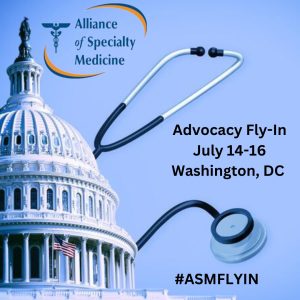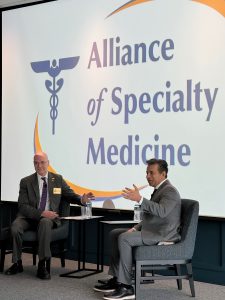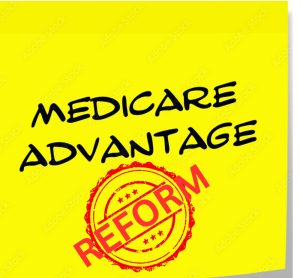The Alliance Submits Comments on the 2026 Medicare Physician Fee Schedule Proposed Rule
Specialtydocs Come to Capitol Hill
Alliance Supports Medicare Advantage Reform Bill, The No Upcodes Act
Specialtydocs Support The Resident Physician Shortage Reduction Act
Specialistydocs Raise Concerns About the Biosimilar Redtape Reduction Act
The Alliance Submits Comments on the 2026 Medicare Physician Fee Schedule Proposed Rule
 On September 5, 2025, the Alliance of Specialty Medicine submitted formal comments to Centers for Medicare and Medicaid Services (CMS) Administrator Mehmet Oz on policy proposals included in the Calendar Year (CY) 2026 Medicare Physician Fee Schedule (PFS) proposed rule. Representing more than 100,000 specialty physicians across 15 member societies, the Alliance raised several concerns and offered recommendations to strengthen patient access to specialty care.
On September 5, 2025, the Alliance of Specialty Medicine submitted formal comments to Centers for Medicare and Medicaid Services (CMS) Administrator Mehmet Oz on policy proposals included in the Calendar Year (CY) 2026 Medicare Physician Fee Schedule (PFS) proposed rule. Representing more than 100,000 specialty physicians across 15 member societies, the Alliance raised several concerns and offered recommendations to strengthen patient access to specialty care.
Payment Policies – On CMS’ payment proposals, the Alliance urged the agency to work with Congress on a long-term fix to ensure Medicare payments reflect rising practice costs, specifically calling for the annual physician update to be tied to the Medicare Economic Index (MEI). The specialty coalition also called on CMS to expand specialty-relevant advanced alternative payment model (APM) opportunities that would allow broader participation and access to the higher payment update established under the Medicare Access and CHIP Reauthorization Act (MACRA).
To address the impact of overstated budget neutrality from the implementation of the complex care add-on code, G2211, the Alliance also urged CMS to make necessary corrections to its utilization assumptions that would return close to one billion dollars to the Physician Fee Schedule.
On the CMS’ proposed “efficiency adjustment,” the Alliance urged CMS to replace its across-the-board 2.5% cut to non-time-based service work values with targeted policies developed in collaboration with specialty societies that reflect where actual efficiencies exist and where they do not. On practice expense methodology change, the coalition cautioned against arbitrary reductions in indirect practice expenses for services delivered in facility settings, recommending a more tailored approach that recognizes the costs borne by independent facility-based physicians, and to phase in any significant changes to protect patient access.
The Alliance also provided comments on global surgery and telehealth, and responded to a request for information addressing the Making America Healthy Again (MAHA) initiative.
Quality and Value-Based Care Policies – The Alliance’s quality comments focused on updates to the Quality Payment Program (QPP), as well as a newly proposed alternative payment model (APM) targeting ambulatory specialty care.
The Alliance supported CMS’ proposal to maintain the current Merit-Based Incentive Payment System (MIPS) performance threshold for the next three years and emphasized the need to incentivize a diverse set of quality measures that reflect differences in specialty care. The Alliance also strongly supported providing a 2-year informational-only feedback period for new cost measures and appreciated updates to the Total Per Capita Cost (TPCC) measure, but requested additional changes to ensure more accurate attribution of specialists. The Alliance also urged CMS to maintain MIPS Value Pathways (MVPs) as a voluntary pathway and requested that CMS reverse its decision to mandate subgroup reporting for multi-specialty group practices reporting MVPs starting in 2026. In the absence of such a reversal, the Alliance supported allowing group practices to attest to their group composition during MVP registration. Finally, the Alliance strongly urged CMS not to pursue the potential future use of procedural codes to assign clinicians to MVPs or to require the reporting of common “core” quality measures within each MVP.
Regarding Qualifying Participants (QPs) in Advanced APMs, the Alliance supported updates to QP determinations that will improve specialist eligibility for QP status. It also urged CMS to work with specialties to test more specialty-focused APMs and to work with Congress to extend the expiring APM incentive payment and lower QP thresholds so that specialists have the opportunity to qualify for this track of the QPP.
Finally, the Alliance strongly opposed the mandatory Ambulatory Specialty Model (ASM), which would rely on the flawed MVP framework to assign specialists inappropriate measures while also imposing greater financial risk than under MIPS.
Specialtydocs Come to Capitol Hill
Medicare Advantage reform and Medicare Physician Reimbursement dominate discussions with Congress, the Administration, and healthcare thought leaders
 In July, the Alliance of Specialty Medicine held its annual Legislative Advocacy Conference in Washington, DC. Nearly one hundred specialists nationwide came to town to advocate for greater access to specialty care.
In July, the Alliance of Specialty Medicine held its annual Legislative Advocacy Conference in Washington, DC. Nearly one hundred specialists nationwide came to town to advocate for greater access to specialty care.
Attendees had the opportunity to hear from Members of Congress about pending legislation related to Medicare physician payment and prior authorization. They also heard from journalist and healthcare reform advocate Wendell Potter, author of the New York Times bestseller “Deadly Spin” and the Editor-in-Chief of Healthcare Uncovered. Other guest speakers included Steven Posnack, Principal Deputy Assistant Secretary for Technology Policy and Principal Deputy National Coordinator for Health Information Technology at the U.S. Department of Health and Human Services, and the Honorable Martin Makary, Commissioner of the Food and Drug Administration. Rounding out things were Mark Abdelmelek, MD, and Tom Johnson, award-winning co-hosts of Why Should I Trust You?, a weekly podcast and YouTube show that looks at the breakdown in trust for science and public health.
The sessions were dominated by discussions about Medicare Advantage, the proposed Medicare Physician Fee Schedule rule, and needed reforms to Prior Authorization.
The Alliance physicians then went to Capitol Hill and met with more than 100 congressional offices to request support for Medicare physician payment reform, prior authorization, Medicare Advantage reform, as well as an increase in the number of Medicare-funded graduate medical education slots.
authorization, Medicare Advantage reform, as well as an increase in the number of Medicare-funded graduate medical education slots.
The Alliance will continue to advocate for these issues as Congress wraps up its session at the end of the year. Issue briefs on all these issues can be found on the Alliance website.
Alliance Supports Medicare Advantage Reform Bill, the No Upcode Act
 The Alliance of Specialty Medicine wrote a letter in support of the bipartisan No UPCODE Act (S. 1105), introduced by Senators Bill Cassidy (R-LA) and Jeff Merkley (D-OR). This bill seeks to address systemic distortions in the Medicare Advantage (MA) risk adjustment system and fully account for any residual coding differences between MA and traditional Medicare.
The Alliance of Specialty Medicine wrote a letter in support of the bipartisan No UPCODE Act (S. 1105), introduced by Senators Bill Cassidy (R-LA) and Jeff Merkley (D-OR). This bill seeks to address systemic distortions in the Medicare Advantage (MA) risk adjustment system and fully account for any residual coding differences between MA and traditional Medicare.Specialtydocs Support The Resident Physician Shortage Reduction Act
In a letter to its bipartisan cosponsors, the Alliance of Specialty Medicine expressed strong support for the Resident Physician Shortage Reduction Act
 (S.2439/H.R.4731). This legislation addresses the critical physician shortage in the U.S. by adding 2,000 new Graduate Medical Education (GME) residency positions annually for seven years. While the physician workforce shortage is felt across all medical fields, studies by the American Association of Medical Colleges (AAMC) show that there will be significant shortages in medical specialties such as neurosurgery, urology, cardiology, and others, driven by an aging population and expanded insurance coverage. The Alliance commends prior efforts to increase GME slots and urges further action to ensure a fully trained specialty physician workforce, which is essential for maintaining access to high-quality healthcare. You can access the full letter by clicking on the link below.
(S.2439/H.R.4731). This legislation addresses the critical physician shortage in the U.S. by adding 2,000 new Graduate Medical Education (GME) residency positions annually for seven years. While the physician workforce shortage is felt across all medical fields, studies by the American Association of Medical Colleges (AAMC) show that there will be significant shortages in medical specialties such as neurosurgery, urology, cardiology, and others, driven by an aging population and expanded insurance coverage. The Alliance commends prior efforts to increase GME slots and urges further action to ensure a fully trained specialty physician workforce, which is essential for maintaining access to high-quality healthcare. You can access the full letter by clicking on the link below.
SPECIALTYDOCS RAISE CONCERNS ABOUT THE BIOSIMILAR RED TAPE ELIMINATION ACT (S.1954)
In a letter to the Senate Committee on Health, Education, Labor, and Pensions, members of the Alliance of Specialty Medicine expressed concerns regarding the Biosimilar Red Tape Elimination Act (S.1954). This legislation addresses the designation of interchangeable biosimilar products.  The Alliance is concerned with the presumption that an approved biosimilar product may be deemed interchangeable with the reference biologic product without requiring additional switching studies by the biopharmaceutical manufacturer. Members are also concerned that health insurance plans and their pharmacy benefit managers (PBMs) may use this Act as a vehicle to exacerbate existing step therapy protocols. You can access the full letter by clicking on the link below.
The Alliance is concerned with the presumption that an approved biosimilar product may be deemed interchangeable with the reference biologic product without requiring additional switching studies by the biopharmaceutical manufacturer. Members are also concerned that health insurance plans and their pharmacy benefit managers (PBMs) may use this Act as a vehicle to exacerbate existing step therapy protocols. You can access the full letter by clicking on the link below.






